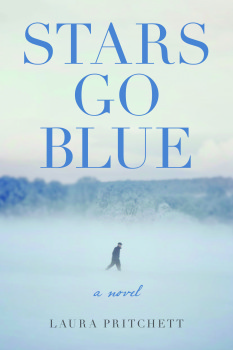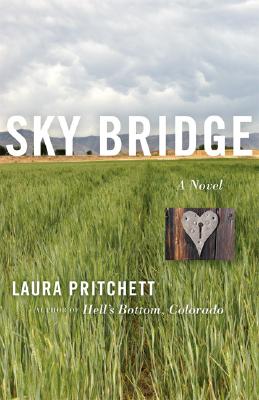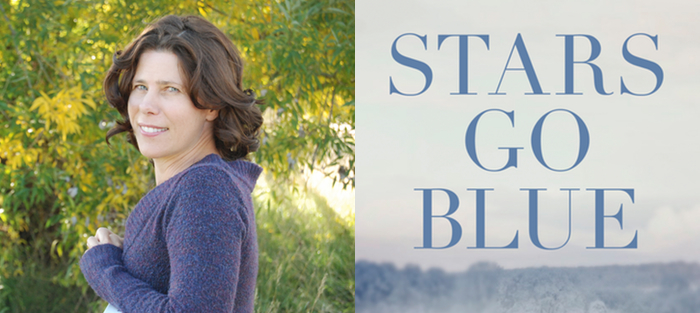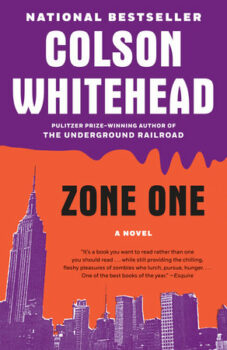I first met Laura Pritchett in June of 2012, at a Pacific University MFA residency. She presented a talk on Sex in Writing. It was a well-attended talk, and people left it feeling a little more audacious. We scurried back to our rooms to practice writing the elusive Good Sex Scene, and Pritchett established herself as a writer and educator completely unafraid of the taboo. And that’s important, because her newest novel, Stars Go Blue, released by Counterpoint this month, deals with another kind of taboo: dementia (Alzheimer’s, specifically) and the effect it has on the patient and his/her caretakers.
There are at least three difficult conversational topics hidden here: the degenerative nature of dementia, the role of caretaker implying the necessity of a silent martyrdom, and voluntary euthanasia. There are currently only four Right to Die states in the U.S. (Oregon, Washington, Montana, and Vermont). This story takes place in Colorado, which is not one of them.
The book is about a family suffering from loss—both historical and impending. Ben is dying, Renny is taking care of him. One of the couple’s adult daughters was murdered, and the murderer is leaving prison. The characters are frustrated with each other, with themselves. What we see inside their points of view reflects what we would see in ourselves in a similar place: grief, resentment, anger, confusion, and love.
Stars Go Blue is a novel with strong bones and a strong heart. I could not put it down.
Pritchett is the author of the novel Sky Bridge (Milkweed Editions, 2005), winner of the WILLA Literary Award, and the collection Hell’s Bottom, Colorado (Milkweed Editions, 2001), which won the PEN USA award and the Milkweed National Fiction Prize. She also writes nonfiction and is a regular contributor to magazines like The Sun, Orion, High Desert Journal, and Colorado Review.
Interview:
Killian Czuba: One of your book’s main concerns is Alzheimer’s. Why?
 Laura Pritchett: There came a day, about ten years ago, when I stood with my father in front of an elevator in Denver—we were helping one of my brothers move—and he had no idea what it was for. I was confused at his confusion: perhaps he’d been out of the city for so long, being a Colorado rancher and all? But no, he had also been a college professor, a geneticist, a world-traveler famous for his research. Soon after, he was diagnosed with Alzheimer’s.
Laura Pritchett: There came a day, about ten years ago, when I stood with my father in front of an elevator in Denver—we were helping one of my brothers move—and he had no idea what it was for. I was confused at his confusion: perhaps he’d been out of the city for so long, being a Colorado rancher and all? But no, he had also been a college professor, a geneticist, a world-traveler famous for his research. Soon after, he was diagnosed with Alzheimer’s.
Since then, it’s been a strange path for the whole gaggle of my family, particularly for my mother, who became his primary caregiver. As for me, these last ten years have been marked by my walks with him across the family ranch, and, as a writer, to better understand him, the disease, the man he was becoming, our relationship.
The irony struck me on many occasions: as he increasingly lost words, I increasingly gained them. I started to write more about more about him. For many years, this writing was (unsurprisingly) from my point of view, my take on the whole thing. But then I started to write from his point of view.
Writing was, first and foremost, my way of loving him more during this time of saying goodbye.
You have two primary points of view in the work, Ben and Renny. Which was more difficult to convey on the page?
One would think (or at least, I thought) writing from the point of view of Renny, the caregiver, would be easier. After all, she has clarity of thought, so can voice her story. But no, it was not easier. How to represent someone so worn down, so exhausted, so conflicted that they’re unlikable? The three female characters in the book (Renny, Carolyn, and Jess) each embody a different face of caregiving. Each have their limitations: Renny does more of the day-to-day real stuff, but is not as kind; Jess is kind but limits her involvement; and Carolyn is caught somewhere in the middle.
The characters often rely on non-verbal cues to establish relationship because of Ben’s inability to always communicate clearly. It’s subtle, but does so much here.
Of the novels I’ve written, body language was by far the most important here, since words were often lacking. Or at least, I thought about body language much more. There were some technical writerly things I did to help convey what I needed conveyed: Renny and Ben are generally facing each other, in direct conflict, when they speak. Carolyn and Ben are always walking side-by-side; that is indicative of the relationship they have. Jess and Ben are never seen together, purposefully, in that her role is as a silent helper, one who hangs in the shadows. These are conscious decisions I made as a writer to illustrate, indirectly, the ways in which the relationships had developed.
Some of the writing in your two earlier books—Hell’s Bottom, Colorado and Sky Bridge—deals with stories farther from your personal experiences. What inspired them?
Well, it’s true that I’ve never been a teen mother, I’ve never had to decide about whether or not to have an abortion, I’ve never lost someone to a violent crime. So many of the plots are based on pure imagination, or stories I’ve heard, or situations that I’ve inferred, and so on. On the other hand, I have helped to cut the hide off a calf to graft on to another, I have run cows through the chute (“The Record Keeper” is nearly completely autobiographical), I have seen the death and life that occurs on ranch life. Friends have had to help horses escape a wildfire, or have had to swim into a freezing pond to get dead ducks.
What I think I do is this: I synthesize my own hands-on experience and real-emotional-state with stories I make up in my brain or hear elsewhere. As an example: I was a new mother when I wrote Sky Bridge. I had a crying infant and was exhausted and very scared about this new gig called motherhood. I used that emotional state (and all the details that go along with it, such as scratchy eyeballs from lack of sleep) with a made-up story about a single mom at a minimum-wage job with a boyfriend she didn’t love. That part is all made up. But the real Libby is not made up. Libby’s basic emotional core is me. We are one in the same.
Stars Go Blue reintroduces some characters we first met in Hell’s Bottom. What brought you back to Ben and Renny’s family, in particular? And do you think you might work with side characters in this way again—expanding this little universe throughout future stories?
 All I can say is the same thing many other authors will tell you: certain characters become more-or-less real to you and you wonder what happened to them. Ben and Renny? I love them. I wanted to know what had become of them. So when I conceived the idea to write about a person with Alzheimer’s, I knew it would be Ben. I knew the whole (imaginary) family so well (from my first book and many of my stories) that I could leap right into the family dynamic and personalities.
All I can say is the same thing many other authors will tell you: certain characters become more-or-less real to you and you wonder what happened to them. Ben and Renny? I love them. I wanted to know what had become of them. So when I conceived the idea to write about a person with Alzheimer’s, I knew it would be Ben. I knew the whole (imaginary) family so well (from my first book and many of my stories) that I could leap right into the family dynamic and personalities.
My next finished novel—currently under consideration – actually takes up the characters in my other novel, Sky Bridge. And the one I’m working on now contains a few of the same characters. So, yes, I’m drawn to expanding little universes that I wrote into being.
I remember reading Carol Shield’s work—she’s a Canadian writer most famous for her Pulitzer prize-winning book The Stone Diaries (Penguin Books, 1993). Her books are loosely connected—one character from one book shows up in another and so on. Many writers do this, of course, but the way Shields did it really expanded each book that came before. As in, each book WAS like a bit of an expanding universe, and the universes ran into each other and informed one another. I fell in love with that, and I’m certain that influence has been guiding me.
With the growing knowledge of organizations like VIDA and the desire to diversify the face of literature, what are your feelings about the state, and movement, of literature in the West?
In much of our past literary history, the West has been portrayed one way: white men were the focus, they were quiet and stoic, they had a bunch of broken dreams, and they had minorities and women to help them out. But literature has rapidly changed; we’ve evolved. We’ve quit being so romantic and nostalgic. And new voices have become part of our literary dialogue—voices by minorities, women, and complex men. I am often afraid, however, that we’ve backed ourselves up into another corral.
This is a gross oversimplification, but I believe we writers try to write about compelling stuff, in part, so that readers will buy our books. So we do write about the air and space and mountains and ranches in the West because that is, in part, what makes the West interesting. It’s true that when I look out my window to the mountains, my heart does a little shimmy.
We also write about them because that’s probably what New York publishers want—they like certain patterns to hold. Well, to be really honest, I think we Western writers want the patterns to hold. They give us a sense of who we are. Or who we want to be. We don’t want to be ordinary, with ordinary sadness playing out in ordinary landscapes. So we acquiesce (our characters do) and don the chaps and go fishing—because we feel as if we should.
Besides the ranchers that live all around me in my little rural hometown, there are also painters and musicians, army personnel and homemakers. There are folks suffering from anxiety, schizophrenia, and bi-polar disorders. There are meth addicts, illegal immigrants, the very poor and the very rich. There are plenty of people in the West who aren’t outdoorsy, don’t fish, don’t camp, hike, or fix fence. There are subdivisions, neighborhoods, apartment buildings, and mansions. What about a single and lonely Chicana mother on the streets of Denver, or the single and lonely transplant from L.A. who is gay and living in a new subdivision?
What do you have in mind, going forward?
To keep pushing the boundaries of the literature set in the West. I want the full spectrum and an honest gaze directed at politics, poverty, wealth, sex, sexual orientation, class issues, overpopulation, climate change. A good book’s job is to expose real lives, the blood and heart inside us all.
I try very hard not to be romantic and nostalgic in my writing. With both place and emotions, I don’t want the Hallmark-y sappy stuff. I want the real, raw truth. Always, as a writer, I am seeking to put words to the inchoate, as truthfully as I can.






